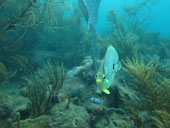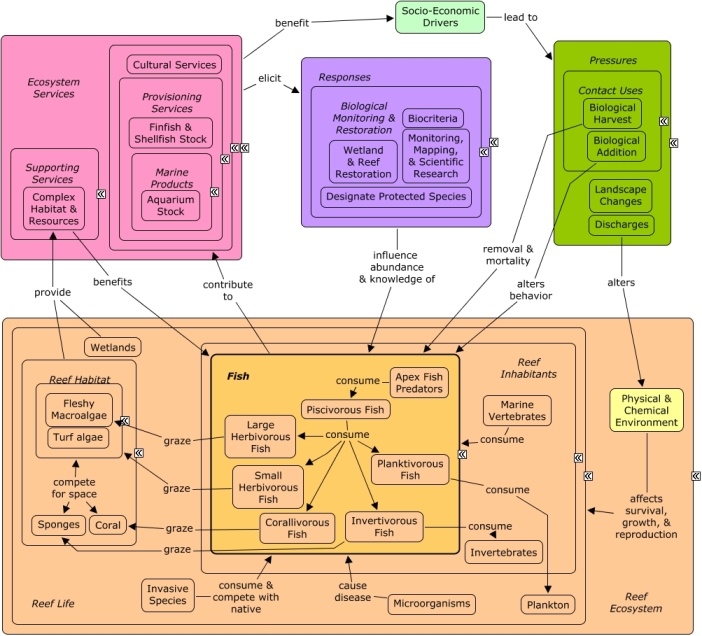ReefLink Database

Corallivorous Fish
Corallivorous fish are fish whose diet primarily consists of live coral.
CMap

CMap Description
The fish found on coral reefs are essential for coastal communities and extremely important in the wider world. Corallivorous fish, such as butterflyfish and parrotfish, consume coral. Corallivorous fish show distinct prey preferences and consume only a small subset of available corals, usually the genera Acropora, Pocillopora and Porites. This selective predation by corallivores can limit abundance and distribution of preferred corals. Parrotfish contribute to the provisioning service of finfish & shellfish stock ., Butterflyfish are important as aquarium stock. All corallivores are important to cultural services of coral reefs. Corallivorous fish are supported by the complex habitat & resources provided by the reef life. Wetlands also provide nursery habitat that supports the fish community . Corallivorous fish are consumed by piscivorous fish, apex fish predators, and marine mammals and reptiles. In addition, competing invasive species, disease causing microorganisms, fishing pressures and disturbed physical & chemical environment will stress or kill corallivorous fish. Biological monitoring, mapping, research, and restoration is paramount to ensure the flow of services from reef fish.Citations
More than 50 citations. Click here to load.
| Citation | Year | Study Location | Study Type | Database Topics |
|---|
Management Options
| Management Option | Description | Sources | Database Topics |
|---|---|---|---|
| Fishing & Harvesting Management: Derelict Fishing Gear & Ghost Fishing | The term "ghost fishing" is used to describe the capture of marine organisms by lost or abandoned fishing gear. This is particularly a problem with gillnets, trammel nets and pots. Gear is usually lost because it becomes stuck on rough bottoms containing corals and stones, causing the buoy line to break during retrieval. Nets or pots may continue to fish for years, with captured fish and crustaceans dying and serving as attracting bait for more fish and organisms. Ghost fishing may therefore represent a serious problem in many areas, causing hidden fishing mortality over a long period of time. This management option co-insides with (#63) Respond to Natural Resource Injuries form Derelict Vessels. | Cochrane, K.L., editor. 2002. A Fishery Manager's Guidebook. Management Measures and their application. Fisheries Technical Paper 424, FAO, Rome. Seas At Risk. 2009. Moving Towards Low Impact Fisheries In Europe Policy Hurdles & Actions. |
Accidental & Illegal Harvest; Apex Fish Predators; Aquaculture; Arthropods; Artificial Habitat; Artisanal Fishing; Biological Addition; Biological Harvest; Commercial Fisheries; Corallivorous Fish; Discharges; Finfish & Shellfish Stock; Fish; Fishing & Harvesting Management; Fishing Sector; Invertivorous Fish; Large Herbivorous Fish; Littering; Lobster, Crab, & Shrimp; Marine Debris; Piscivorous Fish; Planktivorous Fish; Provisioning Services; Recreational Fishing; Trawling & Fishing Gear Damage |
| Monitor & Research: Fisheries Sampling | Improved fisheries sampling programs require improving the spatial resolution of commercial and recreation fisheries-dependent and fisheries-independent sampling programs to provide statistics on catch and effort. Improved sampling can be achieved through evaluating and enhancing census programs by using smaller sampling areas. Also, fishery pre-recruitment monitoring efforts should be continued for long-term prediction of fishery stocks. Last, investigating life histories of fishery species needs to be conducted because it is currently a gap. | NOAA Marine Sanctuary Program. 2007. Florida Keys National Marine Sanctuary revised management plan. National Ocean Service, Key West, FL. |
Apex Fish Predators; Biological Harvest; Biological Monitoring & Restoration; Biological Monitoring, Mapping, & Scientific Research; Corallivorous Fish; Decision Support; Ecosystem Monitoring & Restoration; Finfish & Shellfish Stock; Fish; Fishing & Harvesting Management; Fishing Sector; Invertivorous Fish; Large Herbivorous Fish; Piscivorous Fish; Planktivorous Fish; Provisioning Services; Reef Inhabitants; Reef Life; Security & Public Administration Policies; Small Herbivorous Fish |
| Public Participation: Assist Seafood Watch | Assist Seafood Watch and other sustainable seafood consumption initiatives, in their efforts to educate the public and promote sustainable seafood. | The Coral Reef Alliance (CORAL) the Tour Opperators' Iniative (TOI) and The Center for Environmental Leadership in Business (CELB). 2003. A Practical Guide to Good Practice: Managing Environmental Impacts In The Marine Recreation Sector. SeafoodWatch. 2005. Sustainable Seafood Business Practices. Monteray Bay. |
Accidental & Illegal Harvest; Apex Fish Predators; Aquaculture; Artisanal Fishing; Biological Harvest; Collaboration & Partnering; Commercial Fisheries; Corallivorous Fish; Environmental Education & Outreach; Finfish & Shellfish Stock; Finfish Harvest; Fish; Fisheries & Hunting Policies; Fishing & Harvesting Management; Fishing Sector; Food & Energy Policies; Food & Raw Materials; Invertebrate Harvest; Large Herbivorous Fish; Live Collection; Lobster, Crab, & Shrimp; Molluscs; Provisioning Services; Recreational Fishing; Sectors Filling Human Needs |
| Resource Use Management: Seasonal Fisheries and Harvesting | Finfish and shellfish stocks may be more or less susceptible to fishing pressures during certain times of the year. This may be due to seasonality of recruitment and/or changes in food/predation pressures. If fishing restrictions may be more successful if this seasonality is taken into consideration and fishing pressure adjusted accordingly. | Accidental & Illegal Harvest; Apex Fish Predators; Artisanal Fishing; Biochemical & Genetic Resources; Biological Harvest; Bivalves; Commercial Fisheries; Corallivorous Fish; Decision Support; Echinoderms; Finfish & Shellfish Stock; Finfish Harvest; Fish; Fisheries & Hunting Policies; Fishing & Harvesting Management; Fishing Sector; Food & Energy Policies; Invertebrate Harvest; Invertivorous Fish; Large Herbivorous Fish; Live Collection; Lobster, Crab, & Shrimp; Marine Products; Molluscs; Octopus & Squid; Permitting & Zoning; Piscivorous Fish; Planktivorous Fish; Provisioning Services; Recreational Fishing; Small Herbivorous Fish; Snails & Conch; Sponges; Tourism & Recreation Policies |
Laws
| Legal Citation | Purpose of Law | Management Organization | Database Topics |
|---|
